
The_Economist_USA_-_09_02_2019_watermark
.pdf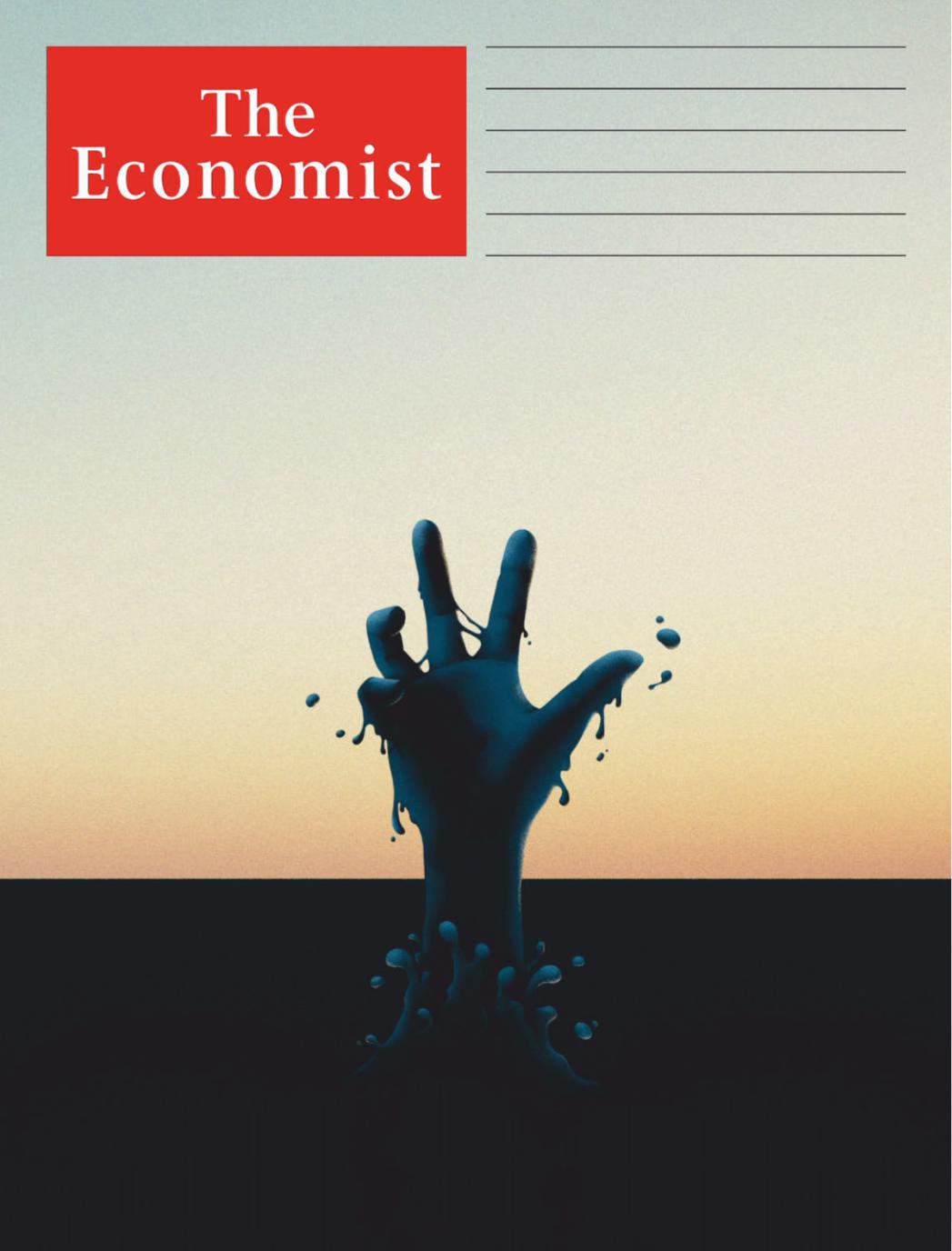
РЕЛИЗ ПОДГОТОВИЛА ГРУППА "What's News" VK.COM/WSNWS
vk.com/id446425943
Is the German model broken?
Iran, 40 years after the revolution
China’s embrace of intellectual property
On the economics of species
FEBRUARY 9TH–15TH 2019
Crude awakening
The truth about Big Oil and climate change

РЕЛИЗ ПОДГОТОВИЛА ГРУППА "What's News" VK.COM/WSNWS
vk.com/id446425943
World-Leading Cyber AI
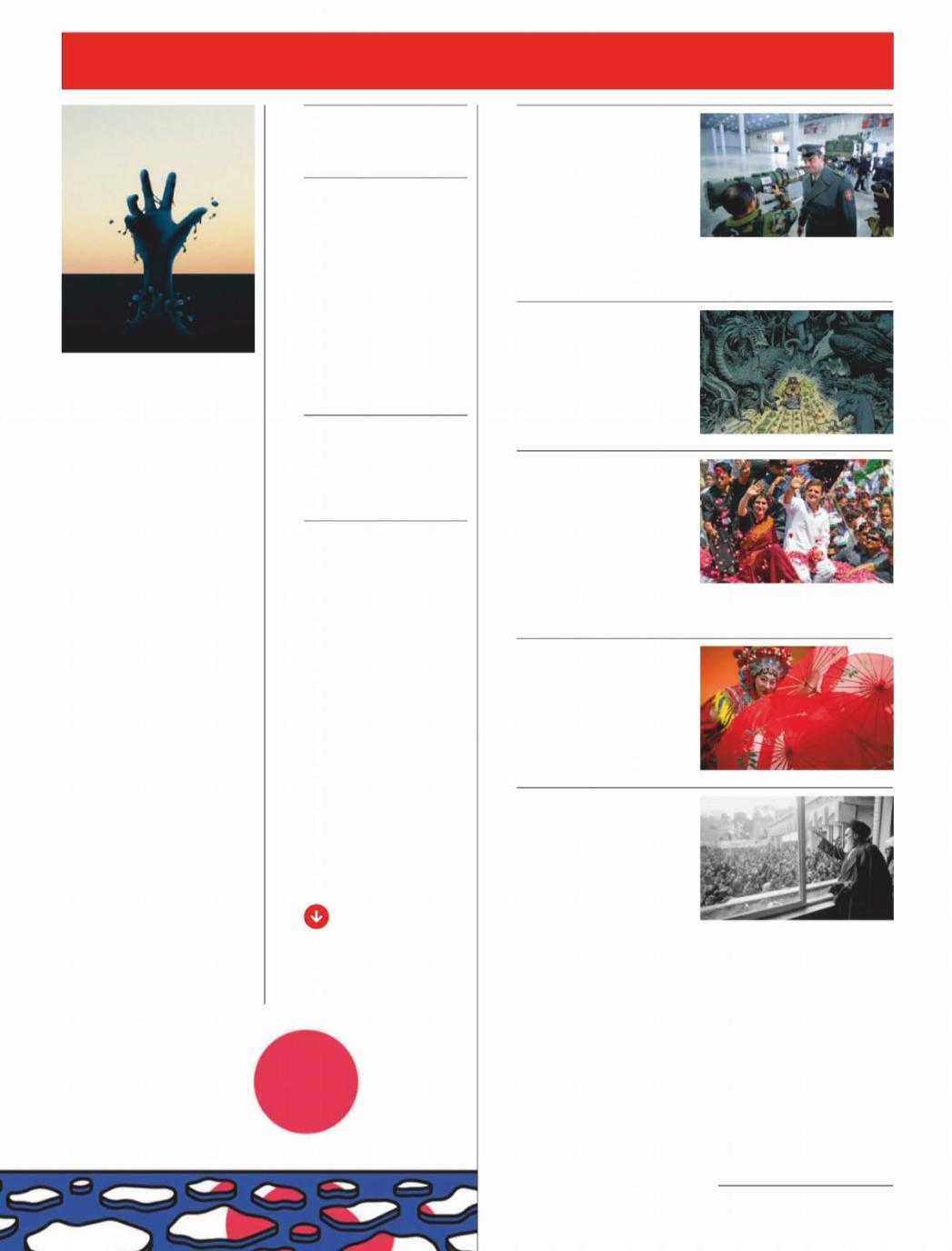
РЕЛИЗ ПОДГОТОВИЛА ГРУППА "What's News" VK.COM/WSNWS
vk.com/id446425943
Contents
|
|
|
|
The world this week |
|
|
|
|
6 |
A round-up of political |
|
|
|
|
|
and business news |
|
|
|
|
|
Leaders |
|
|
|
|
9 |
Energy and climate |
|
|
|
|
|
Crude awakening |
|
|
|
|
10 |
Germany’s economy |
|
|
|
|
|
Time to worry |
|
|
|
|
10 |
Arms control |
|
|
|
|
|
Death of a nuclear pact |
|
|
|
|
12 |
Iran’s revolution at 40 |
|
|
|
|
|
Dealing with the mullahs |
|
On the cover |
|
|
13 |
A new boss for the |
|
|
|
|
World Bank |
||
The oil industry is making a |
|
|
|||
|
|
A qualified pass |
|||
bet that could wreck the |
|
|
|
||
climate: leader, |
page 9 . |
|
Letters |
||
ExxonMobil, a fossil-fuel |
|
|
|||
|
14 |
On the Democratic |
|||
titan, gambles on growth: |
|
||||
|
|
Republic of Congo, |
|||
Briefing, page 16 |
. The Green |
|
|||
|
hygiene, Brexit, chicken, |
||||
New Deal pays little heed to |
|
|
|||
|
|
King Crimson, airlines |
|||
economic orthodoxy: Free |
|
|
|||
|
|
|
|||
exchange, page 67 |
|
|
|
Briefing |
|
• Is the German model broken? |
|
||||
16 |
ExxonMobil |
||||
An economic golden age could |
|
||||
|
|
Bigger oil, amid e orts to |
|||
be coming to an end: leader, |
|
|
|||
|
|
hold back climate change |
|||
page 10 . How Germany’s |
|
|
|||
|
|
|
|||
decentralisation can inoculate |
|
|
|
||
against political unrest: |
page 41 . |
||||
The long expansion, |
page 61 |
|
|
||
• Iran, 40 years after the revolution The Islamic theocracy has failed its people, but Donald Trump’s sanctions could prolong its life: leader, page 12 . Four decades after its revolution, Iran is still stuck in the past, page 36
•China’s embrace of intellectual property Believe it or not, Chinese firms are not all serial thieves of intellectual property: Schumpeter, page 58
•On the economics of species
Conservationists are rethinking how to preserve nature on a
changing planet—and within a |
Banyan The importance |
|
tight budget, page 68 |
to Shinzo Abe of four |
|
|
alluring islands occupied |
|
|
by Russia, |
page 32 |
The Economist February 9th 2019 3
United States
19After the INF treaty
20Missiles and mistrust
21Virginia and shoe polish
21Union shenanigans
22Botox bars
23Elizabeth Warren’s ideas
24Lexington Donald Trump and conservatism
The Americas
25Canada in the global jungle
26Jair Bolsonaro’s congressional win
28Bello The Venezuelan dinosaur
Asia
29India’s Congress party
30Avoiding military service in South Korea
31Turmoil in Thai politics
31Facial fashions in Pakistan
32Banyan Japan’s lost islands
China
33Cultural diplomacy
34Pets proliferate
35Chaguan Understanding Taiwan
Middle East & Africa
36Iran’s revolution turns 40
38Iran and its neighbours
39Bibi’s favourite word
39East African rifts
40Elections in Nigeria
1 Contents continues overleaf
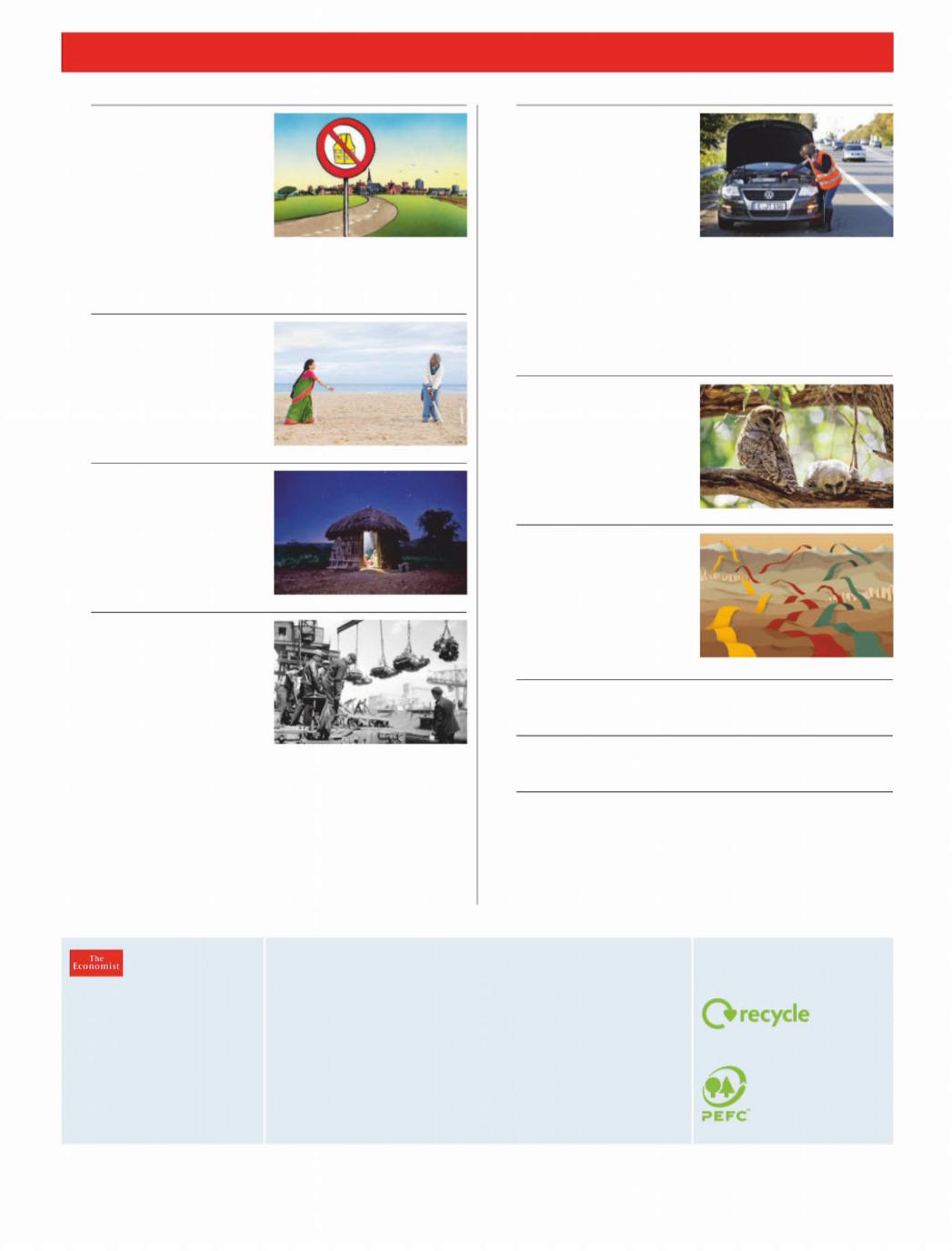
vk.com/id446425943
4Contents
Europe
41No gilets jaunes in Germany
42Macron’s great debate
43Phantom fake medicines
44Wish upon Five Stars
44A treadmill for Hungarian dogs
46Charlemagne Vestager’s progress
Britain
47Asians, the new Europeans
48Irish boom and bust
49Bagehot Learning from John Ruskin
International
50Electricity for the poor
51What light reveals
Business
53America’s manufacturing revival
54Intel’s new boss
55Bartleby McDonald’s and sustainability
56UNIQLO abroad
56Norwegian’s descent
57Food pricing in France
58Schumpeter China and intellectual property
Volume 430 Number 9129
Published since September 1843
to take part in “a severe contest between intelligence, which presses forward,
and an unworthy, timid ignorance obstructing our progress.”
Editorial offices in London and also:
Amsterdam, Beijing , Berlin, Brussels, Cairo,
Chicago, Johannesburg , Madrid, Mexico City,
Moscow, Mumbai, New Delhi, New York, Paris,
San Francisco, São Paulo, Seoul, Shanghai,
Singapore, Tokyo, Washington DC
РЕЛИЗ ПОДГОТОВИЛА ГРУППА "What's News" VK.COM/WSNWS
The Economist February 9th 2019
Finance & economics
61Deceleration in Germany
62The first 1MDB trial
63Optimistic pension plans
63Bill Gross retires
64Australia’s misbehaving banks
64A bitcoin banker dies
65Buttonwood Gauged against the machine
66Donald Trump’s tax cuts
67 Free exchange |
Brave new |
deal |
|
Science & technology
68 Ecology and economics
70Rewilding spreads
Books & arts
71Eurasia
72An innovative Chinese gallery
73Segregation in America
73A memoir of madness
74Women and the sea
Economic & financial indicators
76Statistics on 42 economies
Graphic detail
77Bitcoin’s price crash has not deterred miners
Obituary
78Lamia al-Gailani, guardian of Mesopotamian relics
Subscription service
For our full range of subscription offers, including digital only or print and digital combined, visit:
Economist.com/offers
You can also subscribe by mail, telephone or email:
North America
The Economist Subscription Center,
P.O. Box 46978, St. Louis, MO 63146-6978 Telephone: +1 800 456 6086
Email: customerhelp@economist.com
Latin America & Mexico
The Economist Subscription Center,
P.O. Box 46979, St. Louis, MO 63146-6979 Telephone: +1 636 449 5702
Email: customerhelp@economist.com
One-year print-only subscription (51 issues):
United States.................................... |
US $158.25 (plus tax) |
Canada................................................ |
CA $158.25 (plus tax) |
Latin America....................................... |
US $289 (plus tax) |
Please
PEFC certified
This copy of The Economist is printed on paper sourced from sustainably managed forests certified to PEFC
PEFC/29-31-58 www.pefc.org
© 2019 The Economist Newspaper Limited. All rights reserved. Neither this publication nor any part of it may be reproduced, stored in a retrieval system, or transmitted in any form or by any means, electronic, mechanical, photocopying, recording or otherwise, without the prior permission of The Economist Newspaper Limited. The Economist (ISSN 0013-0613) is published every week, except for a year-end double issue, by The Economist Newspaper Limited, 750 3rd
Avenue, 5th Floor, New York, N Y 10017. The Economist is a registered trademark of The Economist Newspaper Limited. Periodicals postage paid at New York,NY and additional mailing offices. Postmaster : Send address changes to The Economist, P.O. Box 46978, St. Louis , MO. 63146-6978, USA. Canada Post publications mail (Canadian distribution) sales agreement no. 40012331. Return undeliverable Canadian addresses to The Economist, PO Box 7258 STN A, Toronto,
ON M5W 1X9. GST R123236267. Printed by Quad/Graphics, Saratoga Springs, NY 12866

РЕЛИЗ ПОДГОТОВИЛА ГРУППА "What's News" VK.COM/WSNWS
vk.com/id446425943
A banking experience you’ll actually enjoy. Surprising, right?
ĕĝĤěħĥĝ Ĭħ āęĨġĬęĤ čĦĝ āęĞȲī ġĦĮġĬġĦğ ĨĤęěĝī įġĬĠ ĨĝħĨĤĝ ĠĝĪĝ Ĭħ ĠĝĤĨ ıħĭ ĦħĬ īĝĤĤ ıħĭ đĬħĨ Ěı ę ĤħěęĬġħĦ Ĭħ ĠęĦĜĤĝ ıħĭĪ ĝĮĝĪıĜęı ĚęĦģġĦğ ĦĝĝĜī ħĪ ğħ ħĦĤġĦĝ Ĭħ ĤĝęĪĦ ĥħĪĝ Welcome to Banking Reimagined.®
čljĝĪĝĜ Ěı āęĨġĬęĤ čĦĝ Č ÿ ċĝĥĚĝĪ ĄĂćā āęĞȲī Ĝħ ĦħĬ ĨĪħĮġĜĝ ĬĠĝ īęĥĝ īĝĪĮġěĝī ęī ĚęĦģ ĚĪęĦěĠĝī ĚĭĬ ĠęĮĝ ÿĒċī ęĦĜ ęīīħěġęĬĝī įĠħ ěęĦ ĠĝĤĨ ıħĭ āęĞȲī ęĮęġĤęĚĤĝ ġĦ īĝĤĝěĬ ĤħěęĬġħĦī ąħ Ĭħ ĤħěęĬġħĦīěęĨġĬęĤħĦĝěħĥ ĞħĪ ĤħěęĬħĪ ĄħħĜ ęĦĜ ĚĝĮĝĪęğĝī ĨĪħĮġĜĝĜ Ěı ę ĬĠġĪĜ ĨęĪĬı ƣ! ( āęĨġĬęĤ čĦĝ
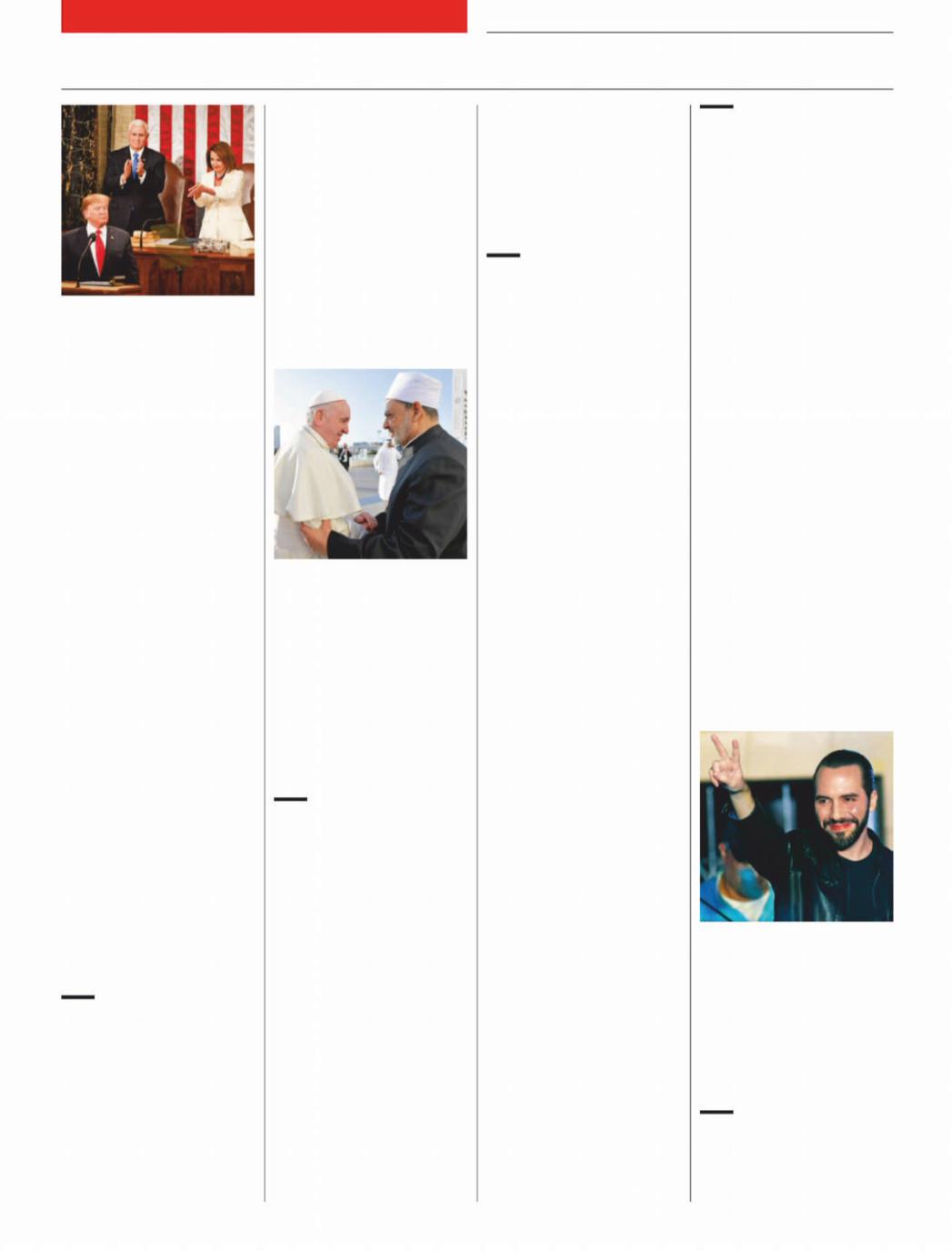
РЕЛИЗ ПОДГОТОВИЛА ГРУППА "What's News" VK.COM/WSNWS
vk.com/id446425943
6 The world this week
Donald Trump gave his state- of-the-union speech to Congress, delayed by a week because of wrangling over government spending. He again called for tougher curbs on illegal immigration, calling it a “moral duty”. He also said that any new trade deal with China “must include real, structural change to end unfair trade practices…and protect American jobs”. In a rare cordial moment, Mr Trump welcomed the record number of women in work, drawing whoops and cheers from Democratic congresswomen, who had dressed in white for the occasion.
Virginia’s state government seemed unable to find anyone to run the place who has not either applied boot polish to his face while at college or been accused of sexual assault. Ralph Northam, a Democrat who was initially unsure whether he was one of those depicted in a photo of a man in blackface and another in Ku Klux Klan robes, remains the state’s governor.
Cory Booker joined the race to become the Democrats’ presidential nominee in 2020. The first black senator to represent New Jersey, Mr Booker is the fourth heavy-hitter to enter the campaign.
Politics
For the ninth week, tens of thousands of protesters in Serbia called on Aleksandar Vucic to resign as president. He has o ered to hold elections, but the demonstrators want a fairer election law and more media time for the opposition.
Keeping up the jaw-jaw
Donald Trump confirmed that he would hold a second summit with Kim Jong Un,
North Korea’s dictator, in Vietnam in late February. Mr Kim has done little to fulfil his pledge at the pair’s last meeting in Singapore to give up his nuclear weapons.
Australia cancelled the residency permit of Huang Xiangmo, a property developer with ties to the Chinese government. Mr Huang has given generous donations to politicians who express pro-China views, as well as to Australia’s two biggest political parties.
Indian o cials resigned in protest at what they saw as the government’s attempts to suppress unflattering economic data. They say unemployment is at a 45-year high of 6.1%. The government says it is reviewing the data.
The Economist February 9th 2019
A leader, but with little power |
|
A dozen members of the |
eu , |
including Germany, France and |
|
Britain, recognised Juan |
|
Guaidó, the leader of |
|
Venezuela’s legislature, as the |
|
country’s interim president. |
|
They acted after Nicolás |
|
Maduro, who won a rigged |
|
election in May, failed to meet |
|
a deadline for calling a proper |
|
ballot. Most Latin American |
|
democracies back Mr Guaidó. |
|
(Venezuela’s constitution |
|
makes him interim president if |
|
the post is not legitimately |
|
filled.) Venezuela’s army |
|
moved to block the delivery of |
|
food aid, which might fill |
|
empty bellies but would also |
|
embarrass the regime. |
|
Brazil’s justice minister, pre- |
|
sented a plan to get tougher on |
|
criminals and go easier on |
|
cops. Police who kill in the line |
|
of duty may escape punish- |
|
ment if they acted out of “fear, |
|
surprise or violent emotion”. A |
|
judge convicted Brazil’s former |
|
president, Luiz Inácio Lula da |
|
Silva, who is already serving a |
|
12-year sentence for corrup- |
|
tion, on an additional corrup- |
|
tion charge and added a sen- |
|
tence of nearly13 years. |
|
The British government approved the extradition of Vijay Mallya to India , the next stage in a process that started in 2016 when the beer-and-travel
tycoon fled to Britain to escape criminal charges related to the collapse of Kingfisher Airlines. Known as the “King of Good Times” both for what he sells and for how he lives, Mr Mallya denies the charges.
A friend indeed
French warplanes bombed a convoy carrying rebels who had crossed into fromChad Libya. The air strikes in support of Chadian troops are a sign of the willingness of France to use force to prop up the government of Idriss Déby, one of its more important regional allies in the fight against jihadists.
|
|
A textbook on constitutional |
|
|
law written by Zhang Qianfan, |
The eu established a special- |
one of China’sleading legal |
|
purpose corporation to help it |
scholars, was removed from |
|
evade sanctions that America |
the country’s bookshops for |
|
has imposed for doing busi- |
promoting Western ideas such |
|
ness with |
Iran . The company,as the rule of law. A recent edict |
|
Instex, will co-ordinate barter |
requires universities to report |
|
exchanges to allow Iran to do |
any books on the topic to the |
|
business with companies from |
authorities. China’s constitu- |
|
European countries still partic- |
tion nods to freedom of speech |
|
ipating in the nuclear non- |
and religion, but in practice the |
|
proliferation deal, from which |
Communist Party’s wishes |
|
America withdrew last year. |
trump it. |
|
A bill was proposed in Hawaii |
|
|
to raise the legal |
smokingage |
|
to100. After that Hawaiians |
|
|
would be free to light up. |
1 |
|
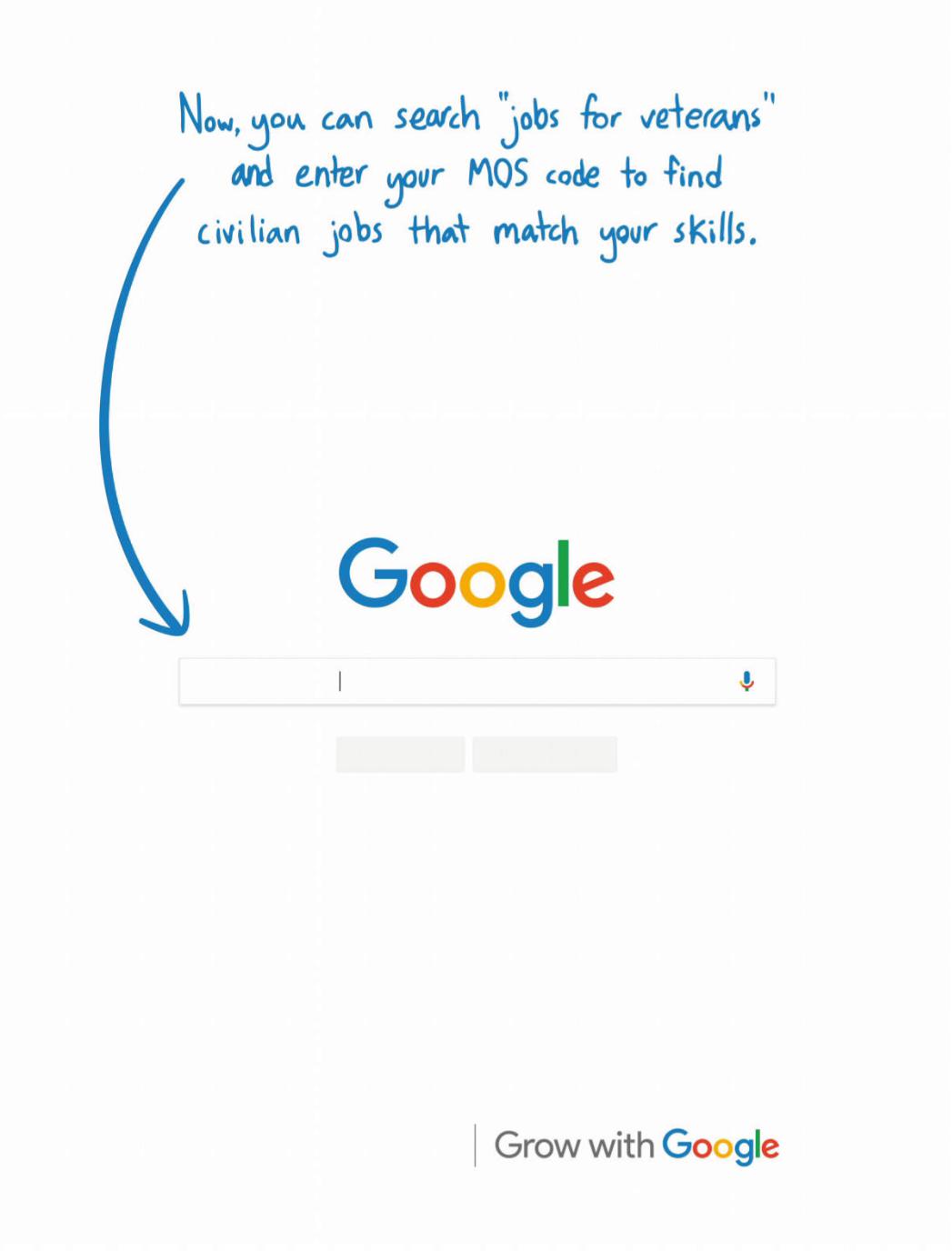
РЕЛИЗ ПОДГОТОВИЛА ГРУППА "What's News" VK.COM/WSNWS
vk.com/id446425943
jobs for veterans
Google Search |
I’m Feeling Lucky |
For free job training resources, visit google.com/grow/veterans
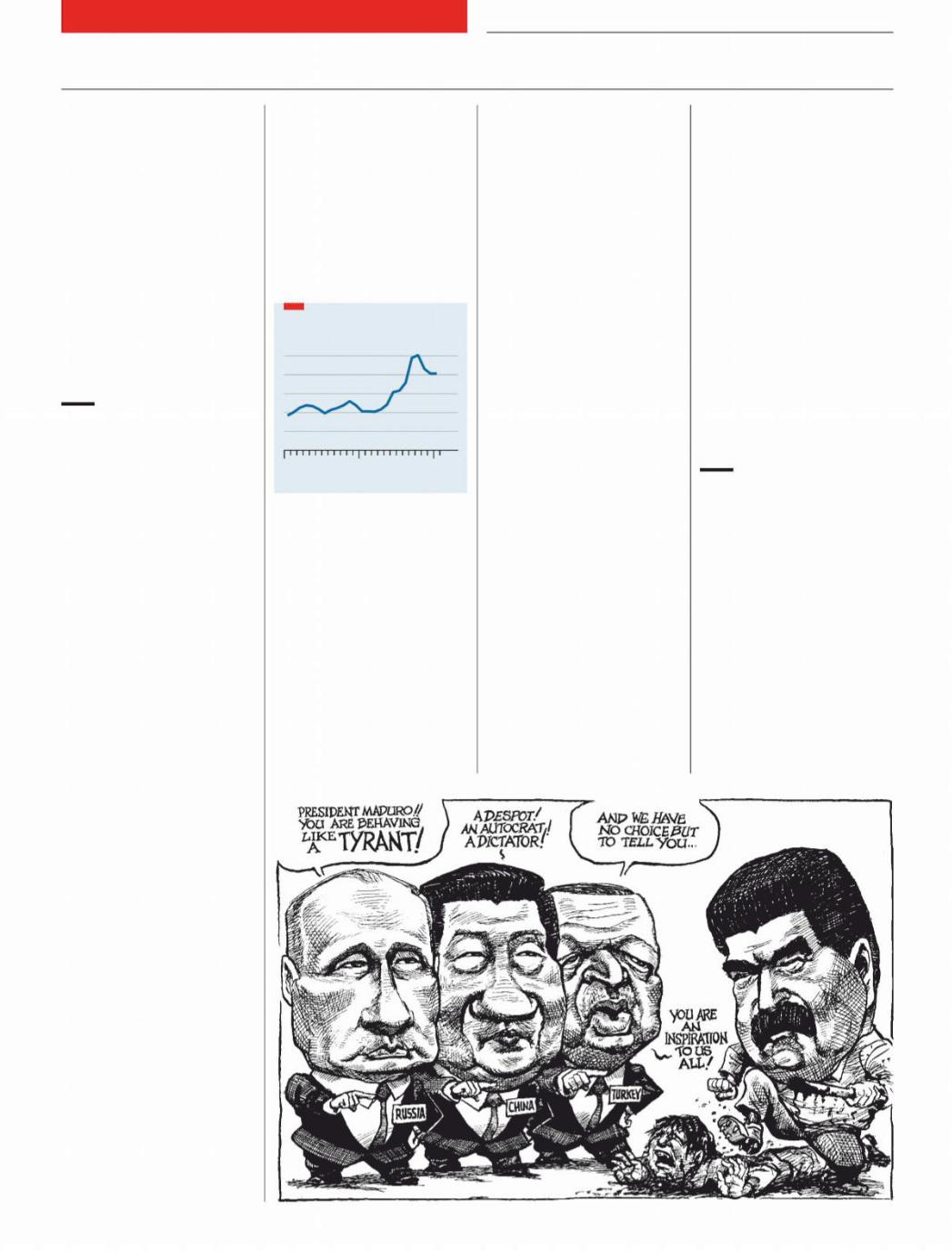
РЕЛИЗ ПОДГОТОВИЛА ГРУППА "What's News" VK.COM/WSNWS
vk.com/id446425943
8 The world this week |
Business |
The Economist February 9th 2019
Donald Trump nominated |
ture which will be overseen by |
India’s central bank cut its key |
|
|||||
David Malpass to become the |
Michael O’Leary, Ryanair’s |
interest rate by a quarter of a |
|
|||||
World Bank’s next president, a |
ebullient chief executive. |
|
percentage point, to 6.25%. It |
|
||||
job that is by tradition filled by |
|
|
|
was the first big policy decision |
|
|||
the American government. Mr |
Underlining the turbulence in |
taken under the new governor, |
|
|||||
Malpass currently heads inter- |
Europe’s discount-flight mar- |
Shaktikanta Das. Mr Das was |
|
|||||
national a airs at the Treasury. |
ket, Germania became the |
given the job after Urjit Patel |
|
|||||
A controversial choice, he has |
latest in a long list of low-cost |
quit amid a quarrel with the |
|
|||||
voiced concerns about the |
carriers to declare bankruptcy. |
government, which has been |
|
|||||
spreading power of multilater- |
The Berlin-based airline flew |
nagging the bank to do more to |
|
|||||
al and global institutions and |
4m passengers last year. |
|
boost the economy ahead of |
|
||||
of Chinese influence. He was |
|
|
|
this year’s election. |
|
|||
part of the negotiating team |
Turkey, consu |
ermp ri ces |
|
|
|
|
||
that agreed to a capital increase |
|
American employers created |
|
|||||
% increase on a year earlier |
|
|
||||||
in the World Bank in return for |
|
304,000 jobs in January, far |
|
|||||
|
|
25 |
|
|||||
restraint on sta wages and |
|
|
more than economists had |
|
||||
|
|
20 |
|
|||||
benefits. |
|
|
|
|
forecast and the100th consec- |
|
||
|
|
|
|
15 |
|
|||
|
|
|
|
|
utive month of job growth. |
|
||
Off the rails |
|
|
|
|
10 |
Average hourly wages in- |
|
|
|
|
|
|
5 |
creased by 3.2% during the |
|
||
Europe’s competition commis- |
|
|
0 |
12-months ending in January. |
|
|||
sioner blocked the merger of |
2017 |
18 |
19 |
|
|
|
||
Alstom with the rail oper- |
Following bumper annual |
|
||||||
|
|
|
|
|||||
ations of |
Siemens |
, reasoningSource: Datastream from Refinitiv |
|
earnings from Chevron, |
|
|||
that the combination of the |
Turkey’s inflation rate crept up |
ExxonMobil and Shell, |
bp |
|||||
French and German companies |
to 20.4% in January. Floods in |
more than doubled its headline |
|
|||||
would lead to higher prices in |
Antalya province, the centre of |
profit in 2018, to $12.7bn, the |
|
|||||
the markets for signalling |
Turkey’s greenhouse produc- |
most since the downturn in oil |
|
|||||
systems and high-speed trains. |
tion of vegetables and fruits, |
prices that began in 2014. |
|
|||||
Supporters of the deal, such as |
helped push food inflation up |
|
|
|
||||
Bruno Le Maire, the French |
to 31%, the highest reading |
Despite a widely panned rede- |
|
|||||
finance minister, said it was a |
since 2004 and up from 25% in |
sign of its app, Snap, the parent |
|
|||||
mistake because such mega- |
December. Although it is under |
company of |
Snapchat, |
|
||||
mergers are vital to take on the |
political pressure to reduce |
increased revenues by 36% in |
|
|||||
might of Chinese companies. |
interest rates, the central bank |
the last three months of 2018 |
|
|||||
However, in some markets a |
recently committed itself to |
compared with the same quar- |
|
|||||
combined Alstom-Siemens |
maintain its tight monetary |
ter a year earlier. Having never |
|
|||||
would have been three times |
stance until price pressures |
reported a profit since going |
|
|||||
bigger than its largest rival. |
weaken. Happily, it also fore- |
public in 2017, investors took |
|
|||||
Nissan’s reversal of a promise |
cast that inflation will fall by |
comfort in the halving of its |
|
|||||
the end of the year. |
|
loss for the quarter, to $192m. |
|
|||||
to build the X-Trail |
at itssuv |
|
|
|
|
|
|
|
factory in Sunderland, a city in |
|
|
|
|
|
|
||
the north of England, was |
|
|
|
|
|
|
||
blamed by Remainers on Brit- |
|
|
|
|
|
|
||
ain’s commitment to leave the |
|
|
|
|
|
|
||
European Union. The carmaker |
|
|
|
|
|
|
||
said that Brexit was a concern. |
|
|
|
|
|
|
||
But its decision was also driven |
|
|
|
|
|
|
||
by the collapse in demand for |
|
|
|
|
|
|
||
diesel and the lower costs of |
|
|
|
|
|
|
||
making the vehicle in Japan. |
|
|
|
|
|
|
||
Ryanair reported its first quar- |
|
|
|
|
|
|
||
terly loss since 2014. Europe’s |
|
|
|
|
|
|
||
biggest low-cost airline said |
|
|
|
|
|
|
||
that although passenger num- |
|
|
|
|
|
|
||
bers had grown, the average |
|
|
|
|
|
|
||
fare it was able to charge had |
|
|
|
|
|
|
||
fallen to less than €30 ($34) |
|
|
|
|
|
|
||
because of |
excess short-haul |
|
|
|
|
|
|
|
capacity in Europe. In a nod to shareholder discontent, the airline is replacing its chairman, who has been in the job for over 20 years. It is also moving to set up a group struc-
Sony’s share price tumbled after it reported a big drop in quarterly profit for its gaming division. Rumours that the Japanese electronics giant might release PlayStation 5 next year, its first update to the gaming console in six years, did little to lift its stock.
Internet companies are removing 72% of content flagged as racist or xenophobic in Europe within 24 hours. That is up from 28% in 2016, when Facebook, Microsoft, Twitter and YouTube presented a voluntary code of conduct on hate speech, which in e ect stopped the fromeu imposing its own restrictions.
Gross mistakes
Bill Gross announced his retirement from the investment industry. One of the founders of Pimco, Mr Gross was once known as the Bond King for managing the world’s largest bond fund, which had almost $300bn in assets at its peak. He left Pimco in 2014 after falling out with the firm and has struggled to repeat his success. His current fund manages only $1bn in assets. Summing up the industry in 2010, Mr Gross said “My clients don’t pay me to feel sorry, they pay me to bring them money.”

РЕЛИЗ ПОДГОТОВИЛА ГРУППА "What's News" VK.COM/WSNWS
vk.com/id446425943
Leaders
Leaders 9
Crude awakening
ExxonMobil and the oil industry are making a bet that could end up wrecking the climate
n america the, world’s largest economy and its second big- |
therefore be evil. They are responding to incentives set by soci- |
Igest polluter, climate change is becoming hard to ignore. Ex- |
ety. The financial returns from oil are higher than those from re- |
treme weather has grown more frequent. In November wildfires |
newables. For now, worldwide demand for oil is growing by1-2% |
scorched California; last week Chicago was colder than parts of |
a year, similar to the average over the past five decades—and the |
Mars. Scientists are sounding the alarm more urgently and peo- |
typical major derives a minority of its stockmarket value from |
ple have noticed—73% of Americans polled by Yale University |
profits it will make after 2030. However much the majors are vil- |
late last year said that climate change is real. The left of the |
ified by climate warriors, many of whom drive cars and take |
Democratic Party wants to put a “Green New Deal” at the heart of |
planes, it is not just legal for them to maximise profits, it is also a |
the election in 2020. As expectations shift, the private sector is |
requirement that shareholders can enforce. |
showing signs of adapting. Last year around 20 coal mines shut. |
Some hope that the oil companies will gradually head in a |
Fund managers are prodding firms to become greener. Warren |
new direction, but that looks optimistic. It would be rash to rely |
Bu ett, no sucker for fads, is staking $30bn on clean energy and |
on brilliant innovations to save the day. Global investment in re- |
Elon Musk plans to fill America’s highways with electric cars. |
newables, at $300bn a year, is dwarfed by what is being commit- |
Yet amid the clamour is a single, jarring truth. Demand for oil |
ted to fossil fuels. Even in the car industry, where scores of elec- |
is rising and the energy industry, in America and globally, is |
tric models are being launched, around 85% of vehicles are still |
planning multi-trillion-dollar investments to satisfy it. No firm |
expected to use internal-combustion engines in 2030. |
embodies this strategy better than ExxonMobil, the giant that ri- |
So, too, the boom in ethical investing. Funds with $32trn of |
vals admire and green activists love to hate. As our briefing ex- |
assets have joined to put pressure on the world’s biggest emit- |
plains, it plans to pump 25% more oil and gas in 2025 than in |
ters. Fund managers, facing a collapse in their traditional busi- |
2017. If the rest of the industry pursues even modest growth, the ness, are glad to sell green products which, helpfully, come with
consequence for the climate could be disastrous. |
higher fees. But few big investment groups have dumped the |
|
ExxonMobil shows that the market cannot solve climate |
shares of big energy firms. Despite much publicity, oil compa- |
|
change by itself. Muscular government action is needed. Con- |
nies’ recent commitments to green investors remain modest. |
|
trary to the fears of many Republicans (and |
And do not expect much from the courts. |
|
hopes of some Democrats), that need not in- |
Lawyers are bringing waves of actions accusing |
|
volve a bloated role for the state. |
oil firms of everything from misleading the pub- |
|
For much of the 20th century, the five oil ma- |
lic to being liable for rising sea levels. Some |
|
jors—Chevron, ExxonMobil, Royal Dutch Shell, |
think oil firms will su er the same fate as tobac- |
|
bp and Total—had more clout than some small |
co firms, which faced huge settlements in the |
|
countries. Although the majors’ power has |
1990s. They forget that big tobacco is still in |
|
waned, they still account for 10% of global oil |
business. In June a federal judge in California |
|
and gas output and 16% of upstream invest- |
ruled that climate change was a matter for Con- |
|
ment. They set the tone for smaller, privately owned energy |
gress and diplomacy, not judges. |
|
firms (which control another quarter of investment). And mil- |
The next15 years will be critical for climate change. If innova- |
|
lions of pensioners and other savers rely on their profits. Of the |
tors, investors, the courts and corporate self-interest cannot |
|
20 firms paying the biggest dividends in Europe and America, |
curb fossil fuels, then the burden must fall on the political sys- |
|
four are majors. |
|
tem. In 2017 America said it would withdraw from the Paris |
In 2000 bppromised to go “beyond petroleum” and, on the |
agreement and the Trump administration has tried to resurrect |
|
face of it, the majors have indeed changed. All say that they sup- |
the coal industry. Even so, climate could yet enter the political |
|
port the Paris agreement to limit climate change and all are in- |
mainstream and win cross-party appeal. Polls suggest that mod- |
|
vesting in renewables such as solar. Shell recently said that it |
erate and younger Republicans care. A recent pledge by dozens of |
|
would curb emissions from its products. Yet ultimately you |
prominent economists spanned the partisan divide. |
|
should judge companies by what they do, not what they say. |
The key will be to show centrist voters that cutting emissions |
|
According to ExxonMobil, global oil and gas demand will rise |
is practical and will not leave them much worse o . Although the |
|
by 13% by 2030. All of the majors, not just ExxonMobil, are ex- |
Democrats’ emerging Green New Deal raises awareness, it al- |
|
pected to expand their output. Far from mothballing all their |
most certainly fails this test as it is based on a massive expansion |
|
gasfields and gushers, the industry is investing in upstream pro- |
of government spending and central planning (see Free ex- |
|
jects from Texan shale to high-tech deep-water wells. Oil compa- |
change). The best policy, in America and beyond, is to tax carbon |
|
nies, directly and through trade groups, lobby against measures |
emissions, which ExxonMobil backs. The gilets jaunes in France |
|
that would limit emissions. The trouble is that, according to an |
show how hard that will be. Work will be needed on designing |
|
assessment by the |
ipcc , an intergovernmental climate-sciencepolicies that can command popular support by giving the cash |
|
body, oil and gas production needs to fall by about 20% by 2030 |
raised back to the public in the form of o setting tax cuts. The |
|
and by about 55% by 2050, in order to stop the Earth’s tempera- |
fossil-fuel industry would get smaller, government would not |
|
ture rising by more than1.5°C above its pre-industrial level. |
get bigger and businesses would be free to adapt as they see fit— |
|
It would be wrong to conclude that the energy firms must |
including, even, ExxonMobil. 7 |
|
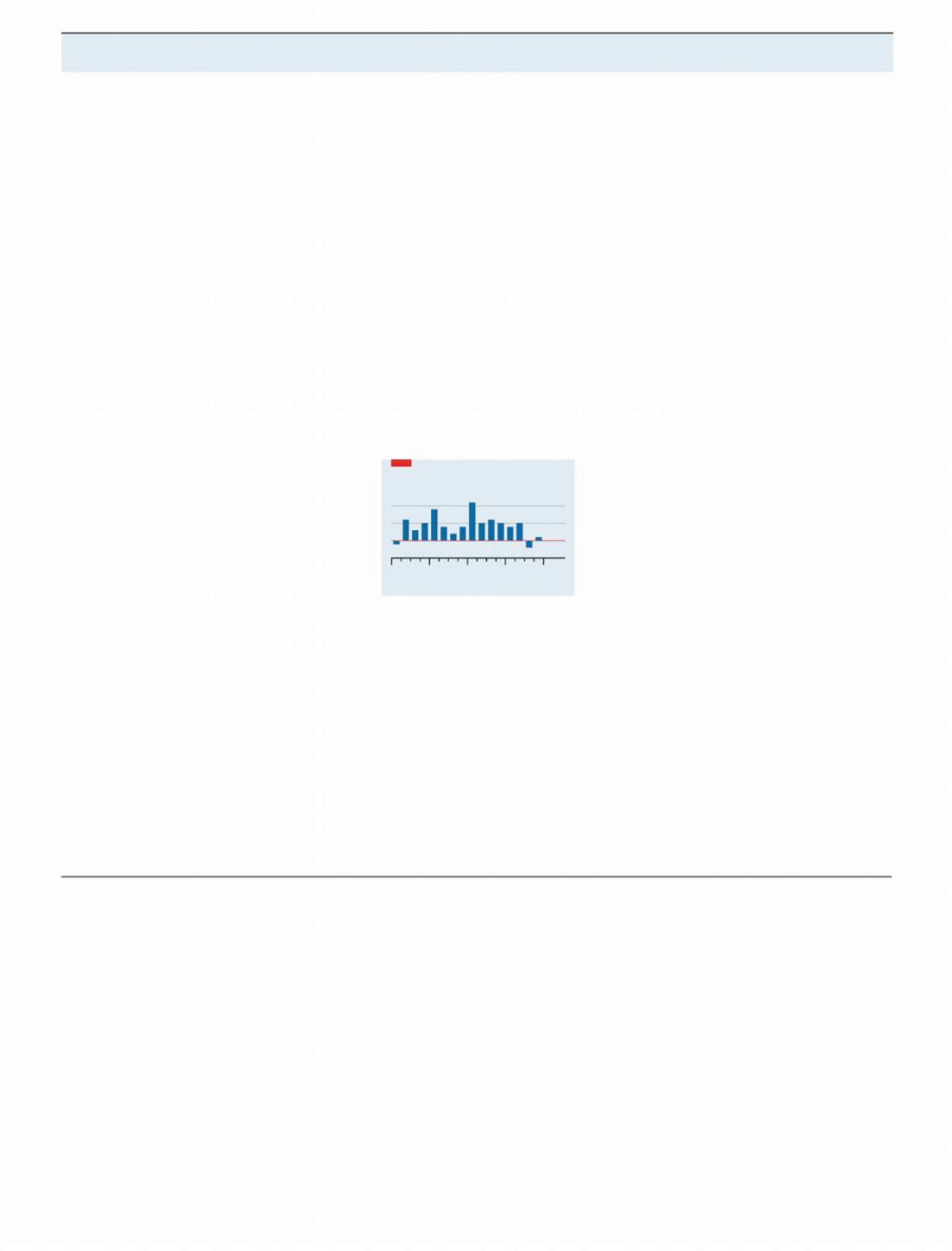
vk.com/id446425943 |
РЕЛИЗ ПОДГОТОВИЛА ГРУППА "What's News" VK.COM/WSNWS |
|
|
10 Leaders |
The Economist February 9th 2019 |
|
Germany ’s economy |
|
Time to worry |
|
An economic golden age in Germany could be coming to an end |
The world is used to a thriving German economy. A decade ago, during the financial crisis, it shed relatively few jobs, as unemployment soared elsewhere. Since then it has been an anchor of fiscal stability while much of the euro zone has struggled with debt and deficits. Its public debt is below the target of 60% of gdp set by eu treaties—and falling. Thanks to labour-market reforms introduced during the 2000s, Germans enjoy levels of employment that beat job-friendly Britain, even as inequality is barely higher than in France. Its geographically dispersed manufacturing industries, made up of about 200,000 small and medi- um-sized firms, have mitigated the regional disparities that have
fuelled populism across the West (see Europe section).
Yet the German economy suddenly looks vulnerable. In the short term it faces a slowdown. It only narrowly
avoided a recession at the end of 2018. Temporary factors, such as tighter emissions standards for cars, explain some of the weakness, but there is little sign of a bounceback. Manufacturing output probably fell in January. Businesses are
losing confidence. Both the imf and the finance 2015 16 ministry have slashed growth forecasts for 2019
(see Finance section). In the longer term, chang-
ing patterns of trade and technology are moving against Germany’s world-beating manufacturers. In response, on February 15th Peter Altmaier, the economy minister, laid out plans to block unwanted foreign takeovers and to promote national and European champions.
Germany is getting both the short and the long term wrong. Start with the business cycle. Many policymakers think the economy is close to overheating, pointing to accelerating wages and forecasts of higher inflation. In their view, slower growth was expected, necessary even. That is complacent. Even before the slowdown, the imf predicted that in 2023 core inflation will be only 2.5%—hardly a sign of runaway prices. In any case, higher German inflation would be welcome, as a way to resolve im-
balances in competitiveness within the euro zone that would elsewhere adjust through exchange rates. The risk is not of overheating but of Europe slipping into a low-growth trap as countries that need to gain competitiveness face an inflation ceiling set too low by Germany.
The slowdown also portends deeper problems for Germany’s globalised economic model. Weakness in part reflects the fallout from the trade war between China and America, two of Germany’s biggest trading partners. Both are increasingly keen on bringing supply chains home. America is due soon to decide whether to raise tari s on European cars. Trade is already becoming more regionalised as uncertainty grows. If global commerce splits into separate trading and regulatory blocs, Germany
will find it harder to sell its goods to customers around the world.
Reform has made Germany’s labour market strong, but it will soon face new challenges. Industrial jobs look particularly vulnerable to
*0
automation, yet lifelong learning and retraining are relatively rare in Germany. The workforce is ageing. Neither the government nor business is much digitised and neither invests
enough. If technological change demands that its economy embraces digital services, Germany will struggle.
The government is not blind to these problems, but Mr Altmaier’s protectionism is the wrong medicine. The left, meanwhile, wants to roll back labour-market reforms. Better to expand a recent boost to infrastructure spending and press ahead, at scale, with tax incentives for private investment. Both should help growth today and boost the economy’s long-term prospects. Significantly lower taxes on households would encourage a rebalancing away from exports and towards consumption. A dose of competition could invigorate coddled service industries. The German economy has had an impressive run, but cracks are appearing. It is time to worry. 7
Arms control
Death of a nuclear pact
|
Russian cheating killed the |
treaty.infAmerica’s response should be measured |
|||
hen it turned 30 in 2017, |
the Intermediate-Range Nucance- |
and jeopardise what is left of global arms control. |
|||
Wlear Forces ( |
inf ) treaty was ailing. Russia had proposedUnder the treaty, America and the Soviet Union scrapped all |
||||
ripping up the pact in 2005. When it was rebu ed it tested an ille- |
ground-based missiles with ranges of between 500 and 5,500km |
||||
gal cruise missile, the 9m 729. A few years later the Obama admin- |
(310-3,400 miles), weapons that could quickly reach targets deep |
||||
istration called out Russian cheating. In December 2018 Ameri- |
into enemy territory. The intention was to remove missiles that |
||||
ca’s nato allies belatedly backed America. So, when Russia failed |
strike so quickly that leaders might be panicked into rash nuc- |
||||
to meet a deadline to destroy the missile this month, America |
lear escalation. |
||||
pulled out of the treaty and Russia soon followed. The only pact |
The temptation is to blame America for the treaty’s demise. It |
||||
to ban an entire class of nuclear weapons will thus expire in Au- |
might have worked harder to win inspections of the 9m 729, per- |
||||
gust. The task for America and |
is to meetnatothe Russian chal- |
haps in return for allowing Russia to look at what it says is a sus- |
|||
lenge without triggering an arms race that would split the alli- |
pect American missile-defence launcher in Romania. It should1 |
||||
